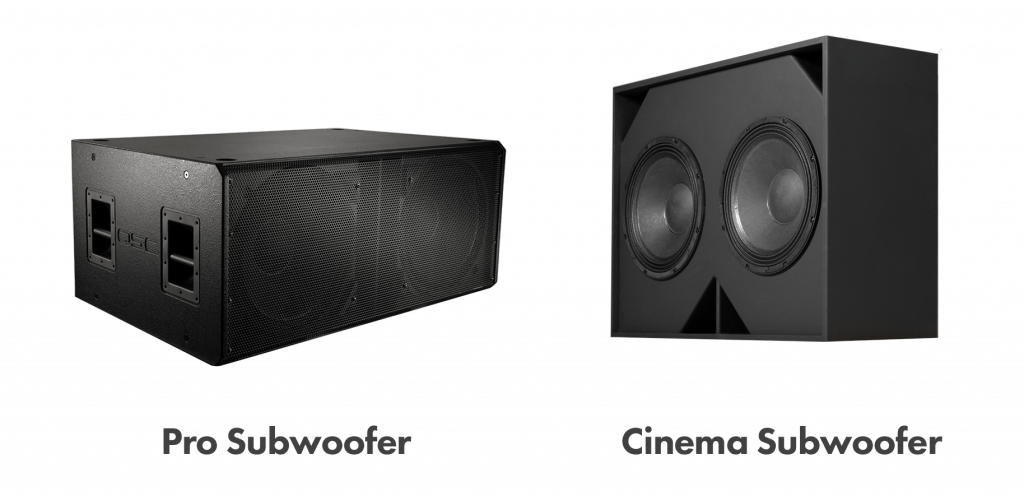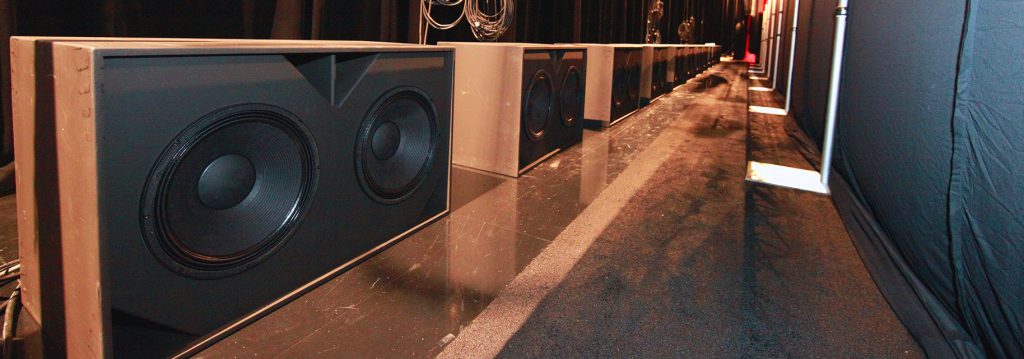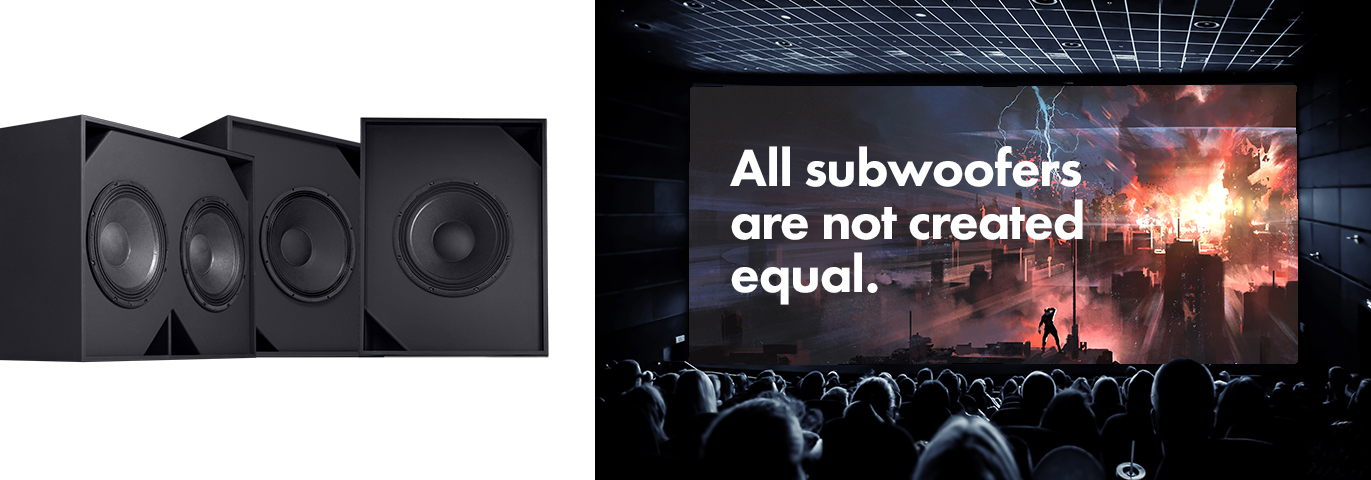How are cinema subwoofers different from professional audio subwoofers?

Superficially, subwoofers for cinema and for professional audio applications may seem quite similar. While both are often big black boxes with dual 18” subwoofers, there are many differences due to the specific needs of each application. Let’s look at some of the differences between a cinema subwoofers, like the QSC SB-7218 and pro audio subwoofers, like our GP218-sw.
The Acoustical Difference
From an acoustic performance perspective, cinema subs are designed to play lower bass than the usual pro audio subwoofer due to the extended low frequency sound effects created by filmmakers. Getting deeper bass requires a number of tradeoffs that aren’t ideal for pro audio use.
As frequency goes down, the cone excursion increases dramatically. This means that cinema subwoofers run out of mechanical cone excursion at much lower power levels than typical pro audio subwoofers. For this reason, in a cinema application, its common to use more subwoofers powered by smaller amplifiers to improve performance, not excessive power. That could mean Premium Large Format cinemas have up to as many as eight QSC SB-7218 dual 18” subwoofers.
Extended bass performance usually requires a larger box volume. This is not a big deal for cinema subwoofers that are shipped one time and set up out of view in a large room. However, smaller is better for subwoofers trucked to different sites every day or that need to fit in to a small space. Since they have to go behind the screen and curtains, the most critical dimension for cinema subwoofers is depth. Height and width are rarely an issue, so the larger box volume or use of more subwoofers can be easily accommodated.
What Features to Consider
As far as more practical features, cinema subwoofers differ quite a bit from professional audio subwoofers. Since a multiplex uses a lot of subwoofers, low cost is critical.

Since the cinema subwoofers are installed one time, they do not have handles that are typically found on pro audio subwoofers. Cinema subs are installed out of sight behind screens or curtains, so there is no need for grills or attractive paint finishes. They are typically painted flat black, do not have logos and use black hardware to prevent any reflections showing through the screen perforations during the movie.
In addition, they use lower cost MDF for the cabinet instead of birch plywood. MDF is quite dense and works great acoustically, but it can’t handle the bumps and impacts that portable subwoofers need to endure. MDF is also more susceptible to water damage, but since cinema subwoofers are never hauled in and out of trucks in the rain, it’s not really an issue. Just like Gremlins, don’t get them wet.
QSC subwoofers are amazing when properly applied. Using the right product for the right application will result in awesome performance and reliability. Trying to overpower a cinema subwoofer and not using enough will only result in blown loudspeakers.

860396 678404This internet internet site is my aspiration, really superb style and style and Perfect subject matter. 352170
348615 848559building websites is not only fun, but it can also produce an income for yourself;; 875474
202339 962613Wonderful post, Im looking forward to hear far more from you!! 208192
920925 60617When I initially commented I clicked the “Notify me when new comments are added” checkbox and now each time a comment is added I get four e-mails with the same comment. Is there any way you can remove me from that service? Appreciate it! 256137
9230 754337Hello! Great stuff, please maintain us posted when you post again something like that! 763308
542722 168571Its nearly impossible to discover knowledgeable males and females during this topic, even so you sound like do you know what youre discussing! Thanks 56472
703815 723350How a lot of an exciting piece of writing, continue creating companion 828907
Interesting blog post. Some tips i would like to contribute is that laptop or computer memory needs to be purchased should your computer still cannot cope with that which you do by using it. One can put in two random access memory boards of 1GB each, for instance, but not certainly one of 1GB and one having 2GB. One should always check the company’s documentation for the PC to make certain what type of storage is essential.
Another thing I have really noticed is that often for many people, low credit score is the results of circumstances outside of their control. For example they may are already saddled by having an illness so they have large bills for collections. Maybe it’s due to a occupation loss or the inability to go to work. Sometimes divorce proceedings can send the budget in the undesired direction. Many thanks for sharing your ideas on this web site.
Have you ever thought about adding a little bit more than just your articles? I mean, what you say is valuable and everything. But think about if you added some great visuals or video clips to give your posts more, “pop”! Your content is excellent but with pics and video clips, this site could definitely be one of the greatest in its field. Wonderful blog!
My developer is trying to persuade me to move to .net from PHP. I have always disliked the idea because of the costs. But he’s tryiong none the less. I’ve been using WordPress on a number of websites for about a year and am anxious about switching to another platform. I have heard excellent things about blogengine.net. Is there a way I can transfer all my wordpress posts into it? Any help would be greatly appreciated!
I am now not certain the place you’re getting your information, but good topic. I must spend some time studying much more or understanding more. Thanks for wonderful info I used to be in search of this info for my mission.
Have you ever considered publishing an ebook or guest
authoring on other sites? I have a blog based on the same subjects you discuss and would really like to have
you share some stories/information. I know my viewers would enjoy your work.
If you are even remotely interested, feel free to shoot me
an email.
With havin so much content and articles do you ever run into any problems of plagorism or
copyright infringement? My site has a lot of exclusive content
I’ve either created myself or outsourced but it seems a lot of it
is popping it up all over the web without my authorization. Do you know any methods to help stop content from being
stolen? I’d really appreciate it.
Yet another thing I would like to say is that instead of trying to match all your online degree tutorials on days and nights that you end work (since the majority people are worn out when they come home), try to get most of your classes on the week-ends and only a couple courses for weekdays, even if it means taking some time off your end of the week. This is really good because on the weekends, you will be extra rested as well as concentrated on school work. Thanks for the different points I have mastered from your website.
Wow, that’s what I was exploring for, what a information! present here at this website, thanks
admin of this web site.